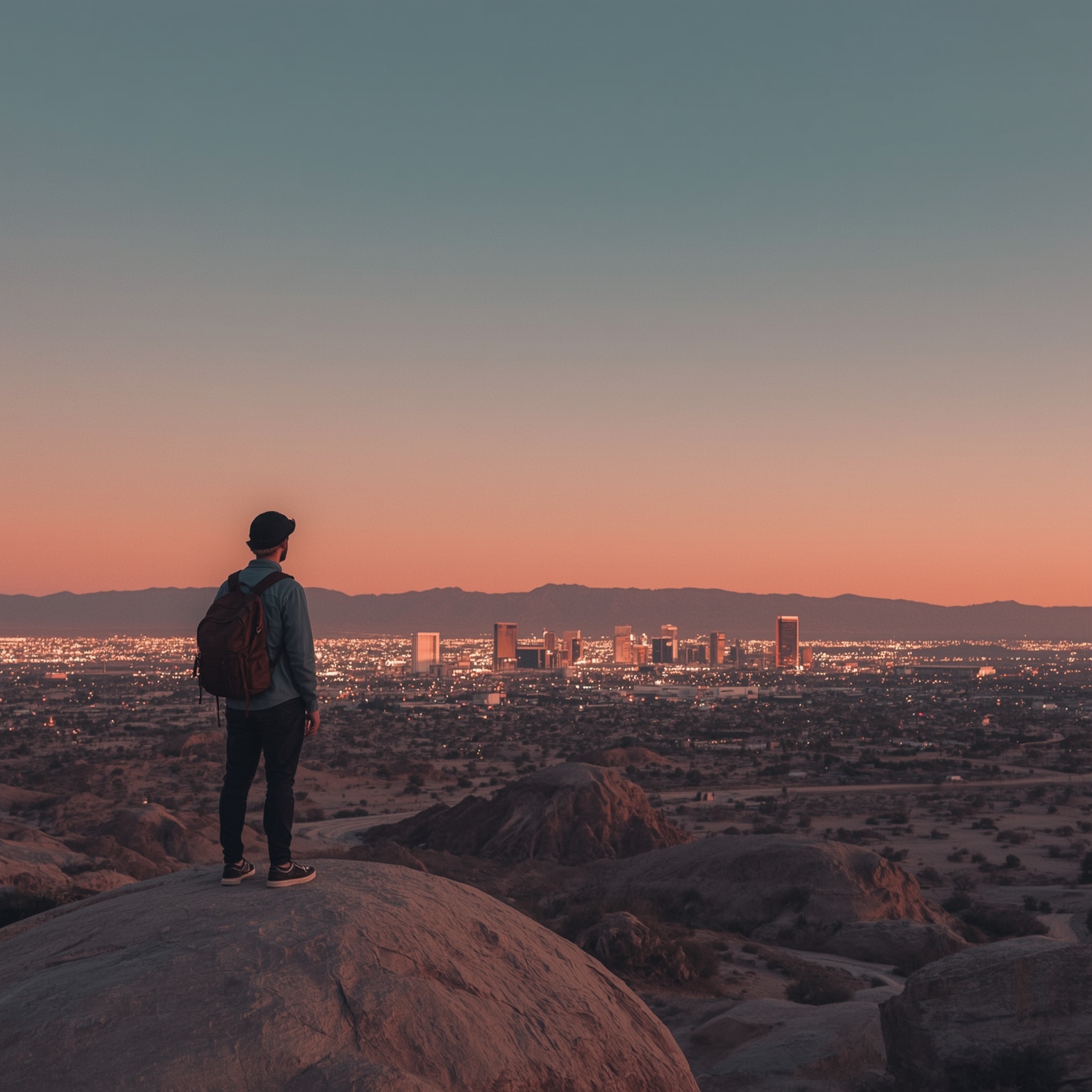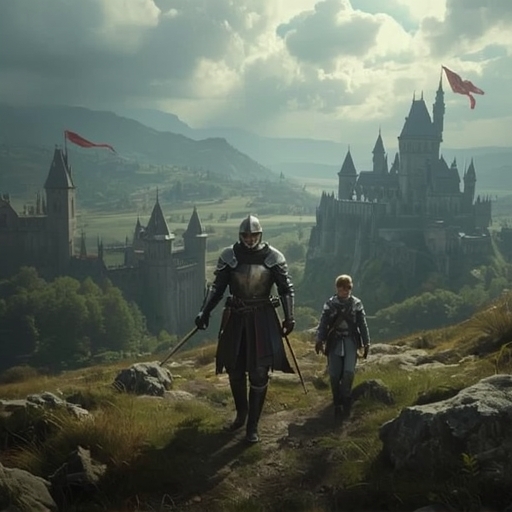We reached Las Vegas just after the sun disappeared below the horizon, our car gliding through the dark expanse of desert until, like a shimmering mirage, the first glints of light began to appear in the distance. What started as a faint glow soon exploded into a spectacle of luminous color — thousands of lights illuminating the skyline in a dazzling display that transformed the barren landscape into a metropolis pulsing with energy. It was both mesmerizing and jarring, a sudden reminder that civilization, in all its extravagance, can spring from the stillness of emptiness.
For my two college friends and me, this luminous city symbolized the grand finale of our cross-country road trip — a journey we had dreamed up and executed in the euphoric haze following graduation. It was meant to serve as our collective rite of passage, a final adventure before stepping tentatively into adulthood. Las Vegas, notorious for its indulgence and endless nightlife, seemed the ideal—if perhaps clichéd—destination to mark that chapter’s close. We imagined it would be the crescendo of our travels, a place to celebrate our freedom before routine and responsibility found their way back into our lives.
But our first full day in the city unfolded not with reckless abandon but with the slowness of recovery. We lounged in our hotel room, exhausted from consecutive days on the road, and lost ourselves in hours of television marathons — first an entire arc of “Below Deck,” which fed our wanderlust for seafaring adventures, and later “The Hangover,” an ironic choice that only heightened the anticipation of the chaos we assumed awaited us outside. When night finally came, we set out with renewed resolve to experience everything the legendary city promised.
Yet, as so often happens when expectation collides with reality, my enthusiasm quickly faltered. The world of neon lights, cacophonous slot machines, and frenetic casino floors failed to stir even a flicker of excitement within me. Though I had suspected as much, the confirmation landed heavily: I was not, and perhaps never would be, someone who found joy in that particular brand of noise and spectacle.
I have always been more inclined toward intimate settings — quiet evenings shared with close friends, a few glasses of wine, laughter echoing from inside jokes, and those spontaneous PowerPoint presentations I sometimes delivered, half-serious and half-satirical, on who I imagined myself to have been in some previous life. A part of me had hoped this trip to Las Vegas might shake that tendency, coax out a more daring, spontaneous version of myself — the uninhibited twenty-two-year-old I thought I was supposed to become.
When we entered our first—and ultimately last—casino, I anticipated cinematic elegance: crowded roulette tables, tuxedoed gamblers, and glamorous women wearing sequined gowns. Instead, the scene was startlingly ordinary. Row upon row of patrons sat transfixed before slot machines, their faces illuminated by the mechanical glow of spinning reels, their attention consumed by a game that seemed endless. The air was thick with cigarette smoke, heavy and unrelenting, and the disconnected murmur of voices blended into the hum of machinery. It evoked an image of students on a campus walking heads-down into oblivion, eyes glued to their phones, missing entirely the life unfolding around them.
Despite my genuine effort to grasp the allure that others seem to find in that environment, I remained detached. The thrill that supposedly accompanied gambling eluded me altogether. We lingered just long enough to spend a single dollar before promptly leaving. In hindsight, the decision to step away was a quiet acknowledgment of my own boundaries.
The next day offered a shift I hadn’t anticipated. Away from the Strip’s chaotic sensory assault, we ventured thirty-six miles southeast to the Hoover Dam. There, amid monumental architecture and the humbling geography of stone and water, I discovered a peace that had been absent in the city. I was genuinely captivated—by the dam’s massive scale, by the way human engineering had intersected with natural grandeur, and by small details that told quieter stories. One plaque in particular, a modest memorial to a dog that had died during the dam’s construction, arrested my attention more deeply than any neon sign could. It encapsulated humanity—the tenderness that persists even within mammoth feats of power and progress.
My fascination lingered long after we left. My search history became a catalog of Hoover Dam trivia, from statistics about its construction to anecdotes about the people who built it. The site’s gift shop, often dismissed as a tourist trap, became my playground; I browsed shelves of trinkets, delighted by the absurdity of items no one truly needed but everyone seemed compelled to touch. My friends and I exchanged jokes about the dam—puns, observations, and running gags that quickly became anchors of our shared humor. To my surprise, that short excursion became one of the most cohesive and fulfilling moments of our trip. Between bursts of laughter, scenic views, and an unremarkable yet delightful Chipwich ice cream sandwich, I felt that intangible sense of contentment I had hoped to find in Las Vegas itself.
At first, I was quietly mortified that, in my early twenties, my favorite memory from a trip to the most famous entertainment capital in America was something so unglamorous and geographically removed. Over time, however, I began to see it differently. That realization sparked a change in how I thought about youth, identity, and the often-unspoken expectations surrounding them. The experience urged me to redefine what it means to be in one’s twenties — not as a decade measured by chaos and constant motion, but as a time to discern what genuinely resonates.
Many might argue that I didn’t give Las Vegas a fair trial. Perhaps if I had visited different venues, tried another show, or leaned more fully into the city’s many offerings, I would have uncovered a different perspective. Yet, for me personally, the value of the trip lay not in the city’s pleasures but in the introspection it provoked. My apparent mismatch with its energy revealed something fundamental: the discomfort I felt was not just about Las Vegas but about the internalized pressure to perform a version of myself that never truly existed.
For years, I believed that avoiding loud music, crowded rooms, and social chaos meant missing out on some essential rite of passage — that my quieter nature was evidence of a deficiency rather than a preference. But Las Vegas made clear that authentic connection, both with others and with oneself, cannot flourish in spaces where you feel ill at ease. There is nothing inherently wrong with craving adventure or the romanticized “wild and free” lifestyle popularized in one’s twenties; yet, forcing that narrative onto oneself can create emotional distance from who you are at the core.
Through the bright lights, the endless noise, and the fleeting moments of disillusionment, I found clarity: exploration has many forms, and sometimes self-discovery emerges not from following the crowd but by acknowledging the limits of your own comfort. My time in Las Vegas was not wasted. It served as a quiet awakening — an unanticipated mirror held up to my own identity, reminding me that fulfillment often resides not in spectacle, but in simplicity, sincerity, and the courage to be content with a gentler kind of adventure.
Sourse: https://www.businessinsider.com/trip-to-las-vegas-bad-but-glad-went-2025-11



